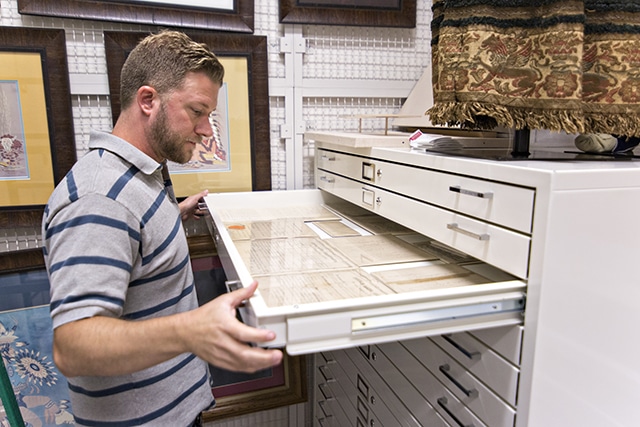
Blake Norton.
With floods and construction, working at the Citizen Potawatomi Nation Cultural Heritage center over the past few months had staff taking on duties that may have never occurred to them when initially applying for their position. As construction progresses, many staff members are now finding more time to devote to their regular tasks. One such project is the CHC’s Tribal Archive and Research Division, which goes to painstaking efforts to help preserve and make accessible cultural and historical material from the Tribe’s past.
Unbeknownst to many, this reporter included, is exactly what the Tribal Archive and Research Division does. Not simply an office that scans Potawatomi family photographs into the digital archives, the specially trained staff of the Tribal Archive and Research Division have acquired specialized degrees and undertake hours of continuing education to stay current with evolving archival practices, ensuring that the CHC remains an innovative facility among both tribal and non-tribal repositories.
“We operate as any reputable research institution or repository does with a stringent set of standards and protocols,” explained CHC Archivist and Curator Blake Norton. “The preservation and recording of such materials are of the upmost importance. Simply throwing a handful of photos and documents in a scanner and assigning brief descriptions of each could not be further from the day to day work we do.”
All materials that are sent in by CPN members, whether photographs, manuscripts or any other historical item, are considered donations. These items are assigned one of two statuses. Gift status items are considered a permanent donation, meaning the material becomes legal property of the Citizen Potawatomi Nation’s historical archives. Loan status items are cared for and maintained by the archival staff, but remain the property of the person or organization who donated.
Adhering to current archival best practices, the Tribal Archive and Research Division implements a digitization standard [2006] that requires each donation to be recorded and preserved digitally via scanning and/or photography. Creating digital records not only supplements their physical counterparts, but enhances preservation standards and provides greater accessibility to the CHC’s collections. Through grant funds and money allocated by the Tribal government, the CHC’s archival labs are equipped to digitize all manner of historical materials including documents, photographs, bound collections, maps and most forms of multimedia.
Though the department accepts donations year round, they typically halt such accepting during the annual Family Reunion Festival. Given the legal, recording and conservational requirements needed to appropriately accept and catalogue donations, the time simply isn’t there for the staff to adequately process the large amount of submissions made by Tribal members during the three day gathering.
As Norton elaborated, “Every collection can be and usually is different, especially when dealing with cultural, spiritual and ethnographic materials. However, we do understand and accommodate walk-ins, but this process is considerably longer. Upon assessment, we accept a collection on a temporary basis or consideration status and submit it for approval by our Collections Committee. Once approved, acquisitions are determined gift or loan and appropriate legal processes are completed.”
However, Norton and the staff at the Tribal Archive and Research Division are always willing to work with members who wish to submit items.
“Collection processing is first-come, first serve, so as to give every donor and their respective collection a fair shake,” said Norton. “As hard as it is, we try our best not to place a greater value on certain materials and allow them to supersede other collections. Obviously, we do receive collections that necessitate immediate or timelier processing, but those are rare and are usually part of a larger project.”
If you are interested in learning more about the Tribal Archive and Research Division, or have questions regarding a future donation, please contact Blake Norton, Archivist and Curator at the CPN Cultural Heritage Center. He can be reached at 405-878-5830 ext.7120 or bnorton@potawatomi.org.
